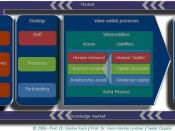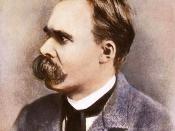Nietzsche's explanation of the origin of knowledge is one that deduces most attempts to error and misdirection. Nietzsche begins his account by attacking all past endeavours of intellect by asserting that, "over immense periods of time the intellect produced nothing but errors"(169). He continues by characterizing the progression of theories as "erroneous articles of faith, which were continually inherited"(169). He also systematically denies most of the early epistemological philosophers' claims of primary qualities, the existence of equal things, and the will being of a free nature. These are the foundations of his explanation of the origin of knowledge.
Nietzsche's definition of truth will be considered now, as it is used to progress his argument. As was previously stated, Nietzsche contends that our intellect only produced error based on our sensory perception of the world. From these perceptions early epistemological philosophers postulated accepted concepts of reality and self.
Ultimately this knowledge became the basis for judgement of the truth and untruth of all epistemological claims. He says, "these propositions became the norms according to which "true" and "untrue" were determined"(169). At this point Nietzsche is talking about truth as it relates to the realm of knowledge, which is a subjective truth.
Recently (in the context of Nietzsche's lifetime), these early epistemological claims had been doubted and denied. So, the basis by which we judge knowledge, has changed. Nietzsche continues his definition of truth by objectifying it. He does so by saying that, "it was only very late that truth emerged--as the weakest form of knowledge"(169). This statement assumes an absolute, or objective truth is at work in the universe. This shift in defintion, caused by the realization of error in past epistemological postulations is considered in his following contention: "the strength of knowledge does not...


